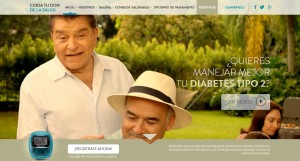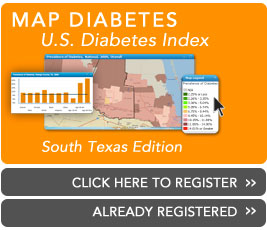Stories written by Diabetes Rio Grande
Posted by Diabetes Rio Grande
Minority Diabetes Reports
Friday, February 5th, 2016
Urban Indian Health Institute, March 2015
Diabetes Mellitus is a major public health problem among American Indians and Alaska Natives (AI/ANs), and the prevalence of diabetes among AI/AN adults is twice that of non-Hispanic white adults. In an effort to reduce the burden of diabetes among AI/ANs, Congress established the Special Diabetes Program for Indians (SDPI) in 1997. The SDPI provides funding specifically to aid in the prevention and treatment of diabetes in AI/AN communities. SDPI includes the Community-Directed Diabetes Programs (tribal, IHS, and urban) and Initiatives (previously Demonstration Projects; now called the Diabetes Prevention and Healthy Heart Initiatives). This report focuses on the Community-Directed diabetes programs. Read more.
Posted by Diabetes Rio Grande
Clinical Trials
Friday, February 5th, 2016
J Med Internet Res, 23 October 2015
Background: One-third of US adults, 86 million people, have prediabetes. Two-thirds of adults are overweight or obese and at risk for diabetes. Effective and affordable interventions are needed that can reach these 86 million, and others at high risk, to reduce their progression to diagnosed diabetes.
Objective: The aim was to evaluate the effectiveness of a fully automated algorithm-driven behavioral intervention for diabetes prevention, Alive-PD, delivered via the Web, Internet, mobile phone, and automated phone calls. …
Conclusions: Alive-PD improved glycemic control, body weight, BMI, waist circumference, TG/HDL ratio, and diabetes risk. As a fully automated system, the program has high potential for scalability and could potentially reach many of the 86 million US adults who have prediabetes as well as other at-risk groups. Read more.
Posted by Diabetes Rio Grande
Clinical Trials
Friday, February 5th, 2016
Diabetes Care, September 2015/p>
Quality glucose information is a core prerequisite for successful diabetes management. It enables professionals and people with diabetes to make medically relevant decisions on therapy. Details of glucose profile information beyond HbA1c have been largely derived from self-monitoring of blood glucose (SMBG). Given the evidence base demonstrating the benefits of SMBG, its routine use is recommended for diabetes management and therapy by many international and regional guidelines. Today, SMBG is considered an important aspect of the management of glycemic control. Glucose information of high quality, considering the products used and the processes conducted, is also needed in clinical research in order to gain new evidence and insights on effective treatment strategies in diabetes. SMBG is widely and routinely applied in large clinical trials, where it is used to understand the glycemic state, to enhance awareness of the effects of lifestyle modification and the adaptation of treatment including insulin titration, and to enable documentation of intraday pre- and postprandial glucose excursions (glycemic variability) and the subsequent statistical analysis of this and the confirmation of hypoglycemic episodes. …
Reliable glucose information requires a clear definition as part of the study design and protocol, not least to ensure replication of the methodology. Interpretation and comparison of study results may be affected if SMBG methods and results are addressed inconsistently. Read more.
Posted by Diabetes Rio Grande
Clinical Trials
Friday, February 5th, 2016
Am J Clin Nutr, 29 July 2015
Background: Few well-controlled studies have comprehensively examined the effects of very-low-carbohydrate diets on type 2 diabetes (T2D).
Objective: We compared the effects of a very-low-carbohydrate, high–unsaturated fat, low–saturated fat (LC) diet with a high-carbohydrate, low-fat (HC) diet on glycemic control and cardiovascular disease risk factors in T2D after 52 wk. …
Conclusions: Both diets achieved substantial weight loss and reduced HbA1c and fasting glucose. The LC diet, which was high in unsaturated fat and low in saturated fat, achieved greater improvements in the lipid profile, blood glucose stability, and reductions in diabetes medication requirements, suggesting an effective strategy for the optimization of T2D management. Read more.
Posted by Diabetes Rio Grande
Clinical Trials
Friday, February 5th, 2016
J Gen Intern Med, 16 April 2015
Objective
We examined the clinical utility of supplementing type 2 diabetes mellitus (DM) risk counseling with DM genetic test results and counseling. …
Conclusions
Providing patients with genetic test results was not more effective in changing patient behavior to reduce the risk of DM compared to conventional risk counseling. Read more.
Posted by Diabetes Rio Grande
News
Thursday, August 20th, 2015
EndocrinologyAdvisor, 18 June 2015
BOSTON — The competitive bidding program implemented by the Centers for Medicare and Medicaid Services (CMS) has reduced beneficiaries’ access to self-monitoring blood glucose (SMBG) supplies, resulting in increased mortality rates, according to a study presented at the American Diabetes Association (ADA) 75th Scientific Sessions in Boston.
CMS implemented a competitive bidding program for diabetes supplies in nine pilot markets in 2011. CMS intended for this program to help reduce costs for Medicare beneficiaries while still ensuring access to devices and services, including SMBG supplies. The program was officially implemented in July 2013 after CMS reported that there were no negative health care consequences from the pilot program.
The National Minority Quality Forum joined with top endocrinologists to determine the accuracy of the CMS’s conclusions about Medicare beneficiaries with diabetes who require access to SMBG supplies. Read more.
Posted by Diabetes Rio Grande
Minority Diabetes Reports, News
Thursday, August 20th, 2015

Cuida Tu Don de la Salud es una iniciativa pensada en ti para que puedas acceder a la última información y a otros recursos para el manejo de tu diabetes tipo 2. Ha sido desarrollada por Boehringer Ingelheim Pharmaceuticals, Inc., una de las compañías líderes en la investigación y desarrollo de medicamentos para el tratamiento de enfermedades crónicas como la diabetes tipo 2.




























